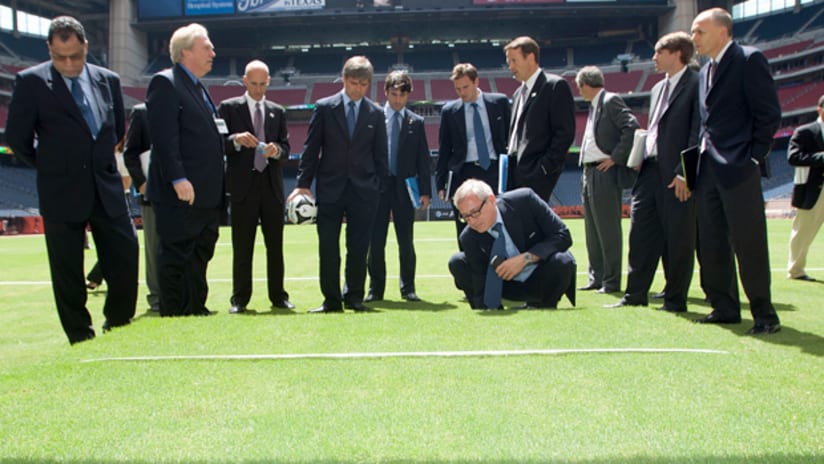NEW YORK – There’s hardly any room on the desk in David Downs’ office in midtown Manhattan, and not much time to waste.
The papers are piling up here, a cluttered sign that the culmination of the bid to land the World Cup in the United States in either 2018 or 2022 is about to hit the home stretch.
The visits are done and the paperwork is in; all that's left now is the lobbying.
"At this point, we just have to make sure we get some votes," said Downs, the executive director of the United States 2018/2022 World Cup bid committee. "It's always a sobering notion to think that this isn't just a business proposal that you negotiate a yes or a no to, but actually a vote. That means it's somewhat out of your control."
Downs and his staff are nearing the end of process that started back in May, when the committee submitted a massive, five-volume Bid Book to land the world’s top sporting event. FIFA inspectors followed earlier this month with a four-day tour of some facilities in consideration as the fateful Dec. 2 deadline announcement nears.
[inlinenode:318080]Until that day – when FIFA announces the hosts for both the 2018 and 2022 World Cups – Downs, USSF president Sunil Gulati and other US reps will crisscross the globe, meeting with members of the committee in their homes and at high-profile events in an effort to convince FIFA what Downs already knows: The US is up to the task.
"It's very important for the world's biggest and most popular sporting event to be held in a proper fashion," Downs said. "It's not, 'Oh, it doesn't really matter. We can hold it in Antarctica.' It also matters to FIFA."
While the perception is that a European country will win the 2018 bid, Downs doesn't see any reason to drop out of the process and focus on the second World Cup.
In fact, there's a chance that the US could pull an upset. If a European country were eliminated early from the 2018 selection process, their only hope of hosting a World Cup would be to throw their support behind the American 2018 bid and hold out for 2022. (FIFA has previously stated that the same continent cannot host two straight World Cups.)
Still, Downs did echo Gulati’s recent statements when it comes to a scenario that the US will shoot solely for 2022.
[inlinenode:318045]"If someone were to give us a real incentive to step aside rather than just because everybody thinks that's the right thing to do, than absolutely, we'd consider it," he said.
"I don't want to rule out that we would consider it as early as Oct. 15 or as late as Dec. 1, but as long as FIFA doesn't order us to – and if they did, they'd have to explain why they made us do all that [paperwork for the '18 bid] - right now we're still in."
Even if the US doesn't earn the right to host the tournament, there will be some good things to come from all the work.
"We always said when we set out to bid that if the bid did nothing else but raise awareness and enthusiasm for the sport in America that would be a positive accomplishment," Downs said.
"In almost everything we do around here, we bare that in mind. Conversely, everything good that happens in the sport reflects positively on the bid, so that's a nice symbiosis.
“I think a little bit of it early on was convincing America that Americans love the sport, but I think most astute American people, if they are sports fans or business people or politicians or municipal people of some kind, they see the trend,” he added.
“You don't have to be a rocket scientist to look at the ever changing nature of the population in the United States to suspect that the sport will be ever more popular in 2050 than it is today.”
But that doesn’t mean Downs is resigned to losing.
"Gosh, I hope we win," he said. "I feel terrible about the trees we killed if we don't."





